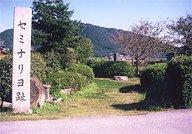|
||||||||
|
|
|
2014-07-04 ArtNo.45172
◆Review:The baptism of the Holy Spirit (Spread the virtues of Wu across the world)
【Review】I am the way and the truth and the life. No one comes to the Father except through me.(John 14:6)
○Spread the virtues of Wu across the world to eradicate war Oda Nobunaga (1534-1582), who had captured Inabayama Castle in Mino and had sent Saito clan into exile, changed the name of both the castle and the surrounding town to Gifu, naming after the legendary Mount Qi (岐山) in China, on which the Zhou dynasty (1046B.C.-256B.C.) started, and revealed his ambition to conquer the whole of Japan by issuing a word of command "Tenka Fubu" which means spreading the seven virtues of "wu (武)" across the world to eradicate war. The seven virtues are (1) the suppression of violence (禁暴), (2) the putting away of weapons (戢兵), (3) preserving the great heritage (保大), (4) stabilizing its merit (定功), (5) giving peace and security to the people (安民), (6) creating harmony among the other states (和衆), and (7) enhancing the wealth of the realm (豐財). Basing at Mount Qi, King Wu had relied on these virtues and had pacified the kingdom and had built the Zhou dynasty. The Chinese character "wu (武)" is composed by "Halberd (戈)" and "Stop (止)". Therefore it meant eradicating war when Nobunaga issued the word of "Tenka Fubu". Naming of "Gifu" and the word of "Tenka Fubu" are both said to have been advised by a Zen priest, Takugen Shuon, who had served as a tutor of Nobunaga and had later become his political adviser. ○Azuchi Seminario Nobunaga, who aimed to conquer the land of Japan not to rely on warfare but on measures of both culture and economy, not only instituted rakuichi rakuza policies as a way to stimulate business and the overall economy through the use of a free market system, but also set up the first Seminary of Japan after building a new castle and a de facto capital of Japan in Azuchi near Kyoto. Azuchi Seminario, a pure Japanese style three stories building set up in a prime location of the castle town, had a tearoom to entertain guests with Japanese tea ceremony and had blue roof tiles same as the castle of Azuchi. Jesuit was proud of this and appreciated Nobunaga's good offices The regular curriculums of Azuchi Seminario included Latin and Japanese classic literature (The Tale of the Heike, etc. ), music (European musical instruments such as flute, organ, and ancient piano and hymn), physical education (swimming and picnic, etc.). Luis Frois is said to have been surprised at language learning ability of the seminario students ○House of Deus That is not all. Nobunaga changed appellation of the watchtower of Azuchi Castle from "天守閣" to "天主閣". Both pronunciations are same "Tenshukaku" in Japanese but are different in meaning. The former just means "watchtower", and the latter means "House of Deus." Nobunaga appears to have set to his seal that God is truthful (John3:33) and to have declared to the world that he intended to conquer the world in the name of Deus, saying, "I am the way and the truth and the life. No one comes to the Father except through me."(John14:6) The declaration of the word "Tenka Fubu" yielded results immediately and not only many feudal lords did homage to Nobunaga but also converted to Christian one after another. These Prefects do not mean that they understood the Bible in Latin and proved their devotion to the teachings of Jesus but found a living Jesus and a living Deus in Nobunaga. ○Gate of Hades Nobunaga, who was not only well versed in Buddhism and Confucianism, but also was interested in Western culture and Christianity, was very enlightened and equipped with a sense of international awareness, something rare in Japanese history. Despite his ambition to bury the hatchet, Nobunaga clamped down severely on those resisted, and was eventually assassinated by a confidant on the half way of unification of Japan. However, when Nobunaga, who had stayed at Honno-ji, a temple in Kyoto with less than 100 guards on that night, heard Mitsuhide's rebellion, he appears to have not had a sense of guilt unlikely to Cuiyan-Lingcan, despite he had taunted Mitsuhide serving as a mediator of the Emperor before the many dignitaries, but condemned Mitsuhide freely and put his wrath on him. After Nobunaga's death, his successor began a large crackdown on Christians in order to stop the tide of Conversion. [Reference] ○Chunqiu Zuozhuan Duke Xuan 12th year The virtues of warfare (wu 武) are (1) the suppression of violence (禁暴), (2) the putting away of weapons (戢兵), (3) preserving the great heritage (保大), (4) stabilizing its merit (定功), (5) giving peace and security to the people (安民), (6) creating harmony among the other states (和衆), and (7) enhancing the wealth of the realm (豐財). ○Seal of Tenka Fubu After Nobunaga revealed his ambition to conquer the whole of Japan. He also started using this new personal seal reading "Tenka Fubu" which means "Spread the virtues of Wu (武 warfare)over the whole land".  ○Azuchi Seminario trace The first Seminary of Japan built by an Italian missionary Gnecchi-Soldo Organtino (1530–1609) under the aid of Oda Nobunaga was destroyed along with the Azuchi Castle after the Honnoji Incident.(Biwako Visitors Bureau)  Please check the contents that have been updated in this article on"The Origin of Christianity", an e-book, which is being updated from time to time. Free download of "The Origin of Christianity"Your CommentsSEAnewsFacebookSEAnewsGoogle |
|
[Your Comments / Unsubscribe]/[您的意见/退订]/[ご意見/配信停止]
Please do not directly reply to the e-mail address which is used for delivering the newsletter. 请别用递送新闻的邮件地址而直接回信。 メールをお届けした送信専用アドレスには返信しないで下さい。 |